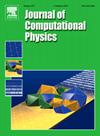FENN: Feature-enhanced neural network for solving partial differential equations involving fluid mechanics
IF 3.8
2区 物理与天体物理
Q2 COMPUTER SCIENCE, INTERDISCIPLINARY APPLICATIONS
引用次数: 0
Abstract
Physics-informed neural networks (PINNs) have shown remarkable prospects in solving forward and inverse problems involving partial differential equations (PDEs). However, PINNs still face the challenge of high computational cost in solving strongly nonlinear PDEs involving fluid dynamics. In this study, inspired by the input design in surrogate modeling, we propose a feature-enhanced neural network. By introducing geometric features including distance and angle or physical features including the solution of the potential flow equation in the inputs of PINNs, FENN can learn the flow more easily, resulting in better performance in terms of both accuracy and efficiency. We establish the feature networks in advance to avoid the invalid PDE loss in FENN caused by neglecting the partial derivatives of the features with respect to space-time coordinates. Through five numerical experiments involving forward, inverse, and parametric problems, we verify that FENN generally reduces the computational cost of PINNs and advanced algorithm by approximately four times and two times, respectively. In addition, it is demonstrated by the numerical experiments that the proposed method can reduce the number of observed data for the inverse problem and successfully solve the parametric problem where PINNs fail.
用于求解流体力学偏微分方程的特征增强神经网络
物理信息神经网络(pinn)在解决涉及偏微分方程(PDEs)的正解和反解问题方面显示出非凡的前景。然而,在求解涉及流体动力学的强非线性偏微分方程时,pin - ns仍然面临着计算成本高的挑战。在这项研究中,受代理建模中的输入设计的启发,我们提出了一个特征增强的神经网络。通过在pinn输入中引入距离、角度等几何特征或势流方程解等物理特征,FENN可以更容易地学习流动,从而在精度和效率方面都有更好的表现。为了避免在FENN中由于忽略特征对时空坐标的偏导数而导致的无效PDE损失,我们提前建立了特征网络。通过五个涉及正演、逆演和参数化问题的数值实验,我们验证了FENN通常将pinn和高级算法的计算成本分别降低了约4倍和2倍。此外,数值实验表明,该方法可以减少反问题的观测数据数量,并成功地解决了pin n失效的参数问题。
本文章由计算机程序翻译,如有差异,请以英文原文为准。
求助全文
约1分钟内获得全文
求助全文
来源期刊

Journal of Computational Physics
物理-计算机:跨学科应用
CiteScore
7.60
自引率
14.60%
发文量
763
审稿时长
5.8 months
期刊介绍:
Journal of Computational Physics thoroughly treats the computational aspects of physical problems, presenting techniques for the numerical solution of mathematical equations arising in all areas of physics. The journal seeks to emphasize methods that cross disciplinary boundaries.
The Journal of Computational Physics also publishes short notes of 4 pages or less (including figures, tables, and references but excluding title pages). Letters to the Editor commenting on articles already published in this Journal will also be considered. Neither notes nor letters should have an abstract.
 求助内容:
求助内容: 应助结果提醒方式:
应助结果提醒方式:


